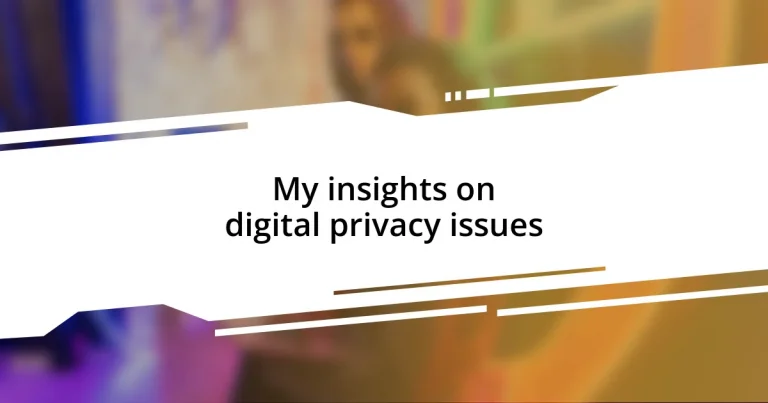Key takeaways:
- Digital privacy risks can arise from social media exposure, public Wi-Fi, and phishing attacks, emphasizing the need for vigilance.
- Data protection is essential to prevent identity theft, build trust, ensure regulatory compliance, and empower individuals over their information.
- Utilizing tools like VPNs, two-factor authentication, and encryption, along with regular software updates, enhances online security.
- Understanding legal rights such as GDPR and CCPA can give individuals control over personal data and empower them to take action when privacy rights are violated.
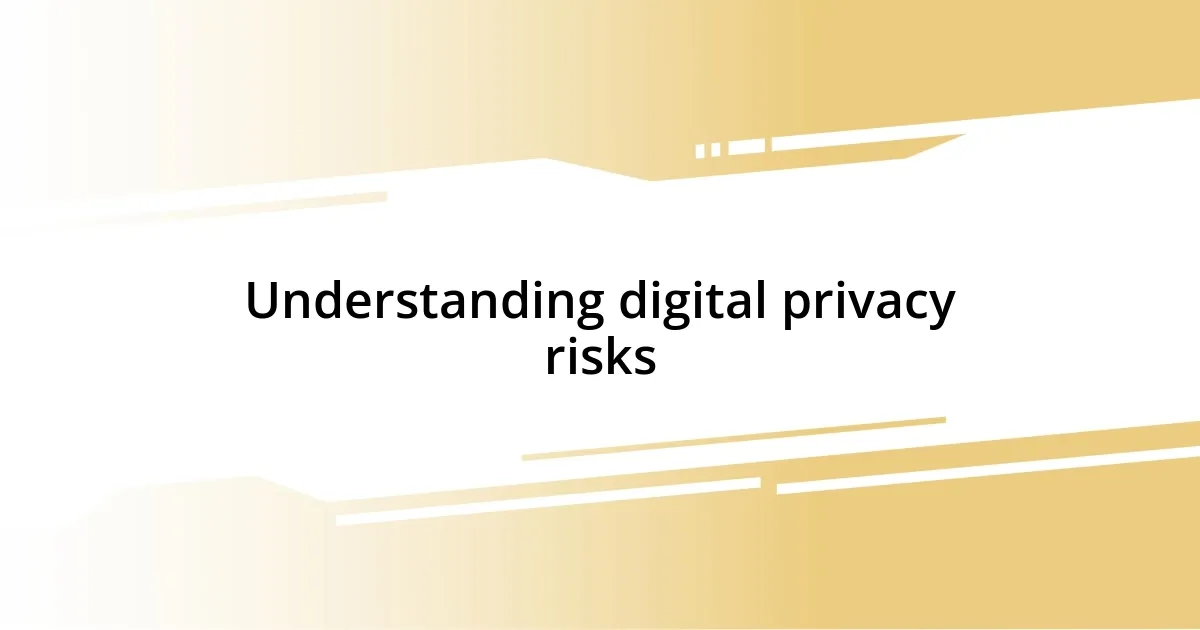
Understanding digital privacy risks
When I think about digital privacy risks, a particular incident comes to mind. A few years back, a friend of mine had her social media account hacked, exposing her personal conversations and photos. It made me realize just how vulnerable our online lives can be and how quickly things can spiral out of control when our privacy is compromised. Are we really aware of what we share online?
Consider how often we click “agree” on those lengthy terms of service without reading them. I used to do this all the time, assuming it was just part of the process. Then, I discovered that these agreements often included clauses allowing data collection and sharing far beyond what I had anticipated. It’s unsettling to think about the extent of surveillance that can occur without our explicit consent.
The evolution of technology has brought many conveniences, yet it has also paved the way for various threats to our privacy. I remember the first time I learned about data brokers – companies that collect and sell our information. It struck me that our data is a commodity, often sold for profit without our awareness. How many of us think about who might be watching or tracking our online activities? This realization can be quite chilling, highlighting just how necessary it is to stay informed and proactive about safeguarding our digital lives.
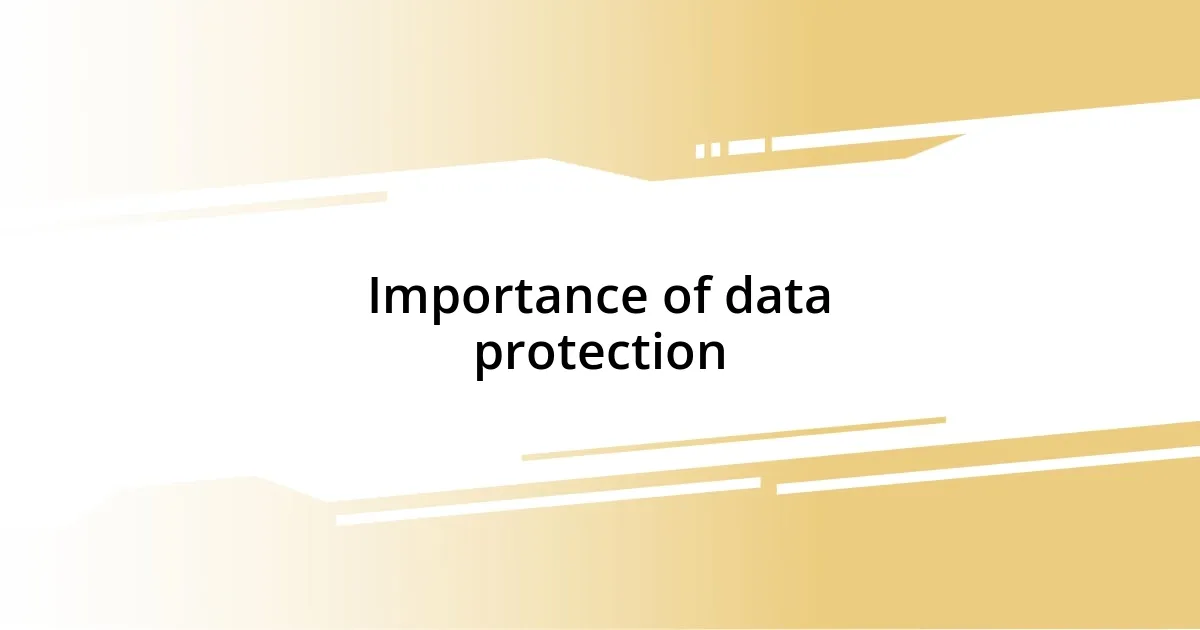
Importance of data protection
Data protection is crucial in our increasingly digital world. Over the years, I’ve learned that when we protect our data, we’re not just safeguarding information; we’re securing our identities and peace of mind. I recall a frustrating moment when a client of mine didn’t realize the extent of personal information they had exposed online. Their experience reminded me that neglecting data protection can lead to significant repercussions, ranging from identity theft to emotional distress.
Here are a few key reasons why data protection is vital:
- Prevents Identity Theft: Taking measures to protect personal information can significantly reduce the risk of identity fraud, which can be both financially and emotionally draining.
- Builds Trust: For businesses, prioritizing data protection fosters customer trust, leading to long-lasting relationships.
- Regulatory Compliance: With the rise of privacy laws, adhering to data protection standards is essential to avoid legal repercussions.
- Safeguards Against Surveillance: Protecting your data helps ensure that your online activities are not unduly monitored or exploited.
- Empowers Individuals: When we understand and implement data protection, we reclaim ownership of our information, giving us control over who accesses it and how it’s used.
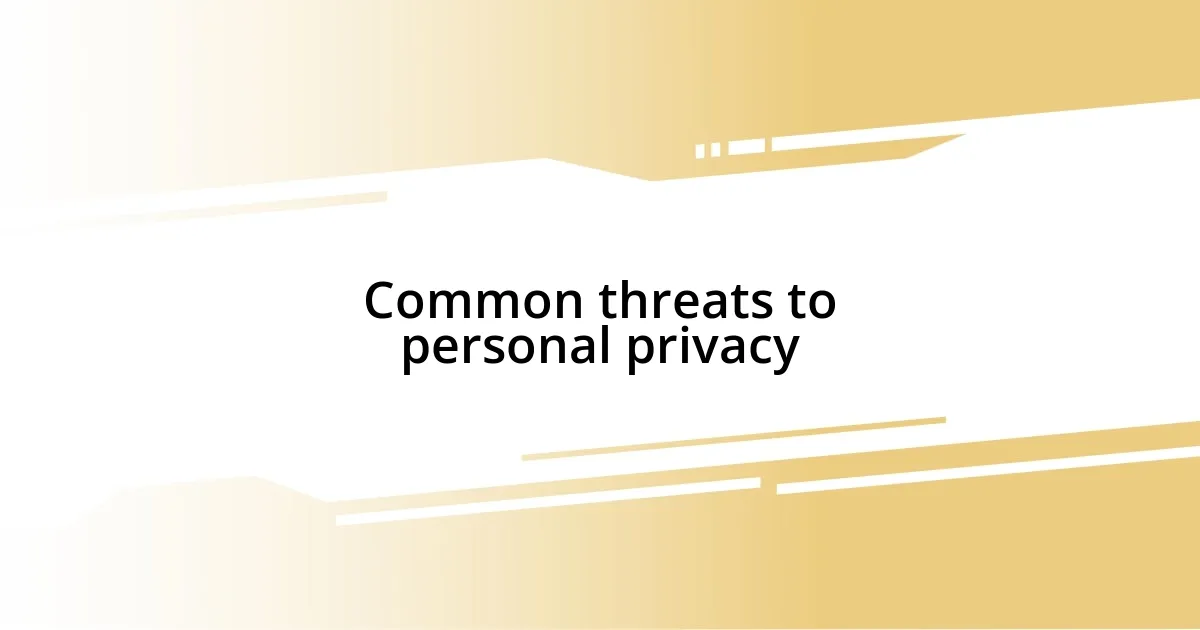
Common threats to personal privacy
Common threats to personal privacy can manifest in various forms, often creeping into our lives without us even realizing it. For example, public Wi-Fi networks pose a significant risk; the last time I used one at a coffee shop, I was surprised to learn that hackers can easily intercept data transmitted over such networks. I felt a jolt of anxiety knowing that my sensitive information could be up for grabs simply because I was unaware of the potential dangers.
Phishing attacks are another common threat that can deceive even the most cautious among us. I remember receiving a seemingly legitimate email from a well-known service, prompting me to “verify my account.” It turned out to be a clever trap designed to capture my login credentials. This experience made me more vigilant about scrutinizing emails and links, reinforcing the idea that maintaining personal privacy requires constant vigilance.
Lastly, social media can unintentionally expose us to privacy threats. I’ve observed friends sharing too much personal information in their profiles, making them targets for identity theft. It’s astonishing how a simple post can lead to unwanted consequences. I often wonder how many of us practice good privacy hygiene on these platforms, which can mean the difference between security and vulnerability.
| Threat | Description |
|---|---|
| Public Wi-Fi | Insecure networks allow hackers to intercept data, posing risks for sensitive information. |
| Phishing Attacks | Deceptive emails and messages that trick users into revealing personal information. |
| Social Media Exposure | Oversharing can lead to identity theft by making personal data accessible to malicious actors. |
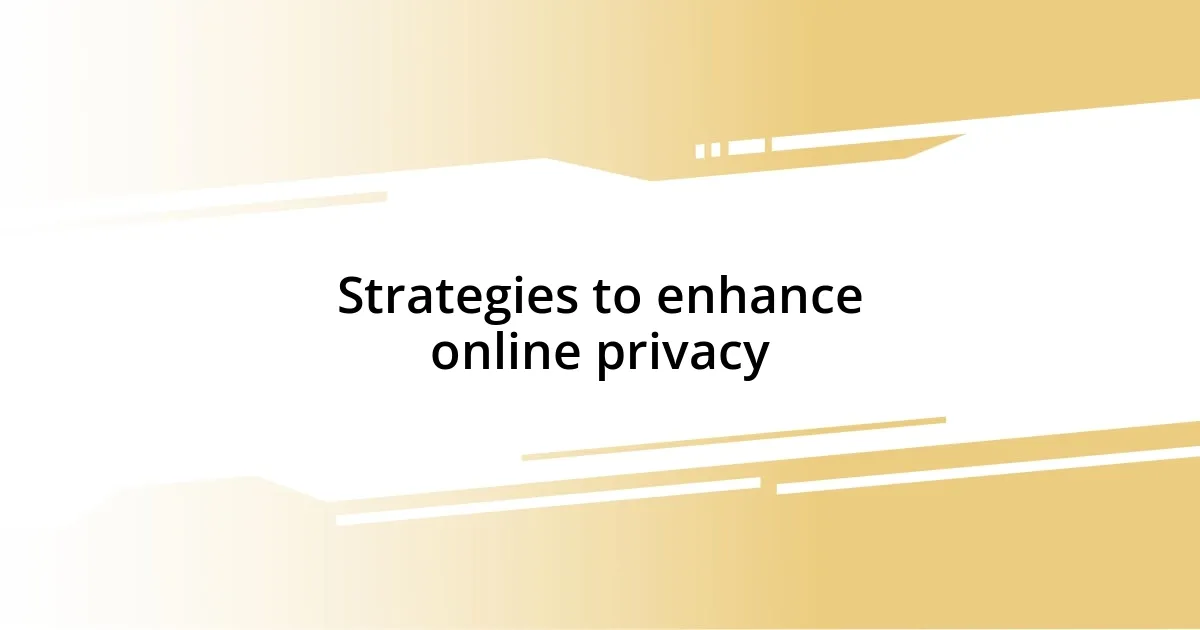
Strategies to enhance online privacy
One powerful strategy to enhance online privacy is utilizing a Virtual Private Network (VPN). I remember my first time using a VPN; it was like a veil that guarded my personal data from prying eyes while I was browsing. Ever since, I’ve felt a sense of relief knowing that my internet traffic is encrypted, especially when I’m connected to public Wi-Fi. Isn’t it comforting to think that a simple toggle could vastly improve your online security?
Another effective approach is adjusting the privacy settings on social media platforms. Initially, I was quite liberal with my information, but after experiencing a surge of unwanted friend requests from unfamiliar accounts, I began to rethink my sharing habits. Now, I carefully review who can see my posts and personal details. Have you ever thought about who might be following your online presence? I found that a few clicks could really tighten my online circles.
Using secure passwords and password managers is just as crucial. Last year, I faced a stressful moment when I couldn’t recall one of my online passwords, which led me to reset it hurriedly. This mishap made me realize the importance of having uniquely generated, complex passwords stored securely. Don’t you think it’s fascinating how something as simple as a password can hold the key to your online world? Now, I recommend password managers to anyone willing to listen; they truly change the game in safeguarding our digital lives.
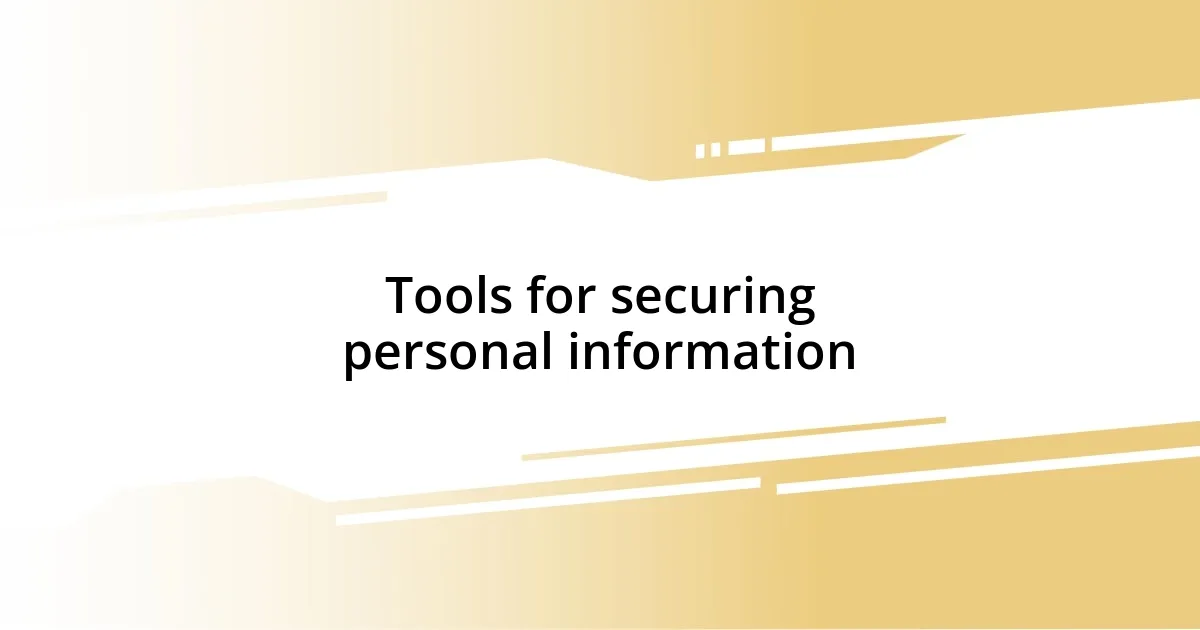
Tools for securing personal information
When it comes to securing personal information, two-factor authentication (2FA) is a game changer. I remember the first time I enabled it on my email; the extra step of receiving a code on my phone felt like an added layer of security I didn’t know I was missing. It’s a bit of a hassle at times, sure, but I can’t help but wonder—wouldn’t you agree it’s worth it for that peace of mind knowing that even if someone gets your password, they can’t access your account without that second key?
Encryption tools are another essential component in the digital privacy toolkit. I once stumbled upon a file encryption software while searching for ways to protect sensitive documents, and it made a world of difference. It felt empowering to know that my personal files were locked behind a digital vault, accessible only to me. Have you ever thought about the power of encryption? It turned my anxiety into confidence about storing sensitive information on my devices.
Lastly, regular software updates are often overlooked yet critical for maintaining security. I had an eye-opening moment when a tech-savvy friend reminded me why I should never ignore those notifications. After updating my systems and apps, I noticed how often vulnerabilities were patched—like closing the door after potential intruders knocked. Isn’t it amazing how a simple update can protect you from threats lurking in the background? Staying proactive in managing these updates is a vital habit that can significantly enhance your personal information security.
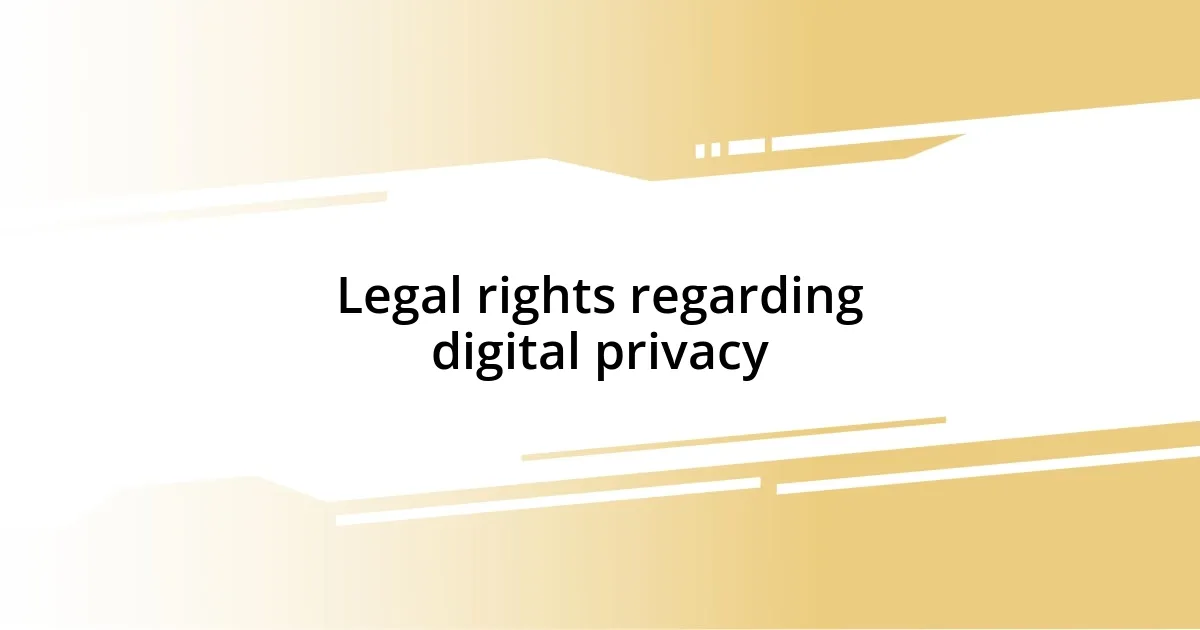
Legal rights regarding digital privacy
Understanding legal rights regarding digital privacy is crucial in this ever-evolving digital landscape. One of my most eye-opening moments was when I realized that many people are unaware of the General Data Protection Regulation (GDPR). This regulation gives individualscontrol over their personal information and obligates companies to be transparent about how they use it. Can you imagine how powerful it feels to know that you have a say in who accesses your data?
It’s also essential to know about the California Consumer Privacy Act (CCPA), which grants residents specific rights, such as the ability to request deletion of personal data. I remember the first time I utilized this right when a subscription service wouldn’t stop bombarding me with targeted ads. Fighting back by requesting them to delete my information felt empowering. Don’t you think it’s fascinating how these rights can put the power back in our hands, even in the digital realm?
Moreover, one aspect that often gets overlooked is the right to seek legal remedies if those rights are violated. I had a close friend who experienced a data breach but didn’t realize they had the right to take action against the company. Reflecting on that situation, it struck me how important it is to educate ourselves about these rights. Have you ever thought about what you would do if your personal data was compromised? Knowing your legal options can provide a sense of security and encourage accountability among companies.












